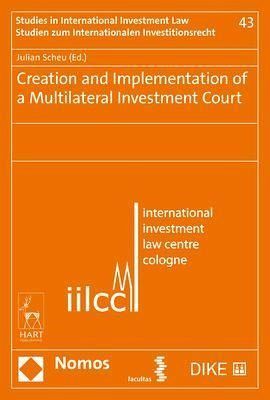Nicht lieferbar

Creation and Implementation of a Multilateral Investment Court
Assistant Editor Lisa Schöttmer
Herausgegeben: Scheu, Julian;Mitarbeit: Schöttmer, Lisa
Versandkostenfrei!
Nicht lieferbar
Starting point of the book is the ongoing reform process on ISDS at UNCITRAL working group III and the proposal to implement an MIC. An introduction sets the stage and provides readers with the latest developments and historical background. On this basis, the following chapters highlight different aspects of creating and implementing an MIC.The chapters cover key elements of the MIC proposal such as the court's institutional framework, the design of an appeal mechanism, the use of procedures for the settlement of mass claims, and the establishment of an advisory centre for developing countries...
Starting point of the book is the ongoing reform process on ISDS at UNCITRAL working group III and the proposal to implement an MIC. An introduction sets the stage and provides readers with the latest developments and historical background. On this basis, the following chapters highlight different aspects of creating and implementing an MIC.The chapters cover key elements of the MIC proposal such as the court's institutional framework, the design of an appeal mechanism, the use of procedures for the settlement of mass claims, and the establishment of an advisory centre for developing countries. In addition, the selection and appointment of judges is discussed. Apart from the court's structure and procedures, questions of implementation arise. How to integrate the MIC into the current system of ISDS? How can the enforcement of its decisions be ensured? On a political level, the MIC project is based on an initiative of the EU. Therefore, the role of the EU in the reform process isanalysed in a separate chapter. Remarks from a practitioner's perspective round up the contributions. Each chapter highlights the legal issues subject to discussion and puts them into a broader context. The aim is to provide readers an understanding of how the different aspects work individually or in combination. The evaluation of reform ideas is based on their potential to efficiently respond to the most prominent criticisms of the current ISDS system.With contributions byIngo Borgdorf, Johanna Braun, Alexander Dünkelsbühler, Leonard Funk, Moritz Keller, Caroline Kittelmann, Niclas Landmann, Carla Müller, Petyo Nikolov, Philipp Reinhold and Julian Scheu.












